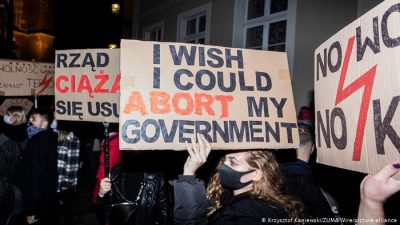Belarusian Protests Are Spilling over into Poland but Warsaw Is Beginning to Blame Russia

Polish leaders at all levels continue to speak with enthusiasm about the need to fully support “peaceful protests” in Belarus and to help them morally and financially. However, with widespread protests across Poland now, the same national leaders are angrily condemning their “peaceful protesters.” Not only do they condemn the protestors, they are also supporting the use of police violence and threaten harsh prison sentences.
The Belarusian protests are for the impositions of neo-liberalism. The Poles however are protesting about abortion rights. Although the reason for protests in Minsk and Warsaw are completely different, they are both using the same methods to protest.
For example, on Sunday the leaders of the women’s strike in Poland officially legitimized the introduction of their advisory council, similar to the Coordinating Council of Belarusian opposition leader Svetlana Tikhanovskaya. Polish protest leader Marta Lempart makes it clear that she has been inspired by events in Minsk:
“We are looking at Belarus and we see the importance of coordinating action.”
Just like in Belarus, the ultimate goal of these Polish rallies is for the unconditional resignation of the government. The official bodies created by Tikhanyovskaya and Lempart, in their own words, should facilitate a “peaceful transfer of power.”
The glorification of events in Belarus by the Polish media, along with the active participation of Warsaw, led the Poles to emulate their protesting neighbors. It is no coincidence that posters saying
“They educated us by romanticizing the uprisings and now they are surprised that we are protesting,” have appeared at rallies in Warsaw.
Weeks ago, Polish Prime Minister Mateusz Morawiecki wrote directly about the need to support protestors in Belarus and even announced a drawing contest to “illustrate the courage and heroism of Belarusian women.” Some of these creative images were used by Poles during a mass rally in Warsaw last Friday.
However, the Polish Prime Minister is now outraged at his people’s methods of protest, calling them “barbaric and illegal,” as well as actively urging law enforcement agencies to arrest protestors. For several weeks, the Polish authorities demanded widespread condemnation of the Alexander Lukashenko government for supposed repression against the Belarussian opposition. And now Polish Deputy Justice Minister Michał Woś is calling on the prosecutor’s office to launch a crackdown on protesters.
“All Polish prosecutors should consider the organizers of illegal meetings to be criminals. Threats to life and health will put them at risk of imprisonment for up to eight years,” Woś said threateningly in an interview with Radio Maryja.
Polish authorities attribute the repression against the protesters to a difficult COVID-19 situation. Local state television channels are constantly spreading the word about how large crowds of people are adversely affecting the health of others during a severe pandemic. Hypocritically, the same media in support of the mass protests in Minsk did not have any health concerns for the Belarusian protestors.
However, the people involved in anti-government actions in Poland are by no means innocent and often resort to harsh and provocative actions. They were aggressive towards law enforcement officers, government officials, and attacked the Catholic Church and priests. Contradictorily, Polish media completely ignore the provocations of Belarusian protestors. In addition, state-run television does not hesitate to call the protesters “left-wing fascists attacking Polish values.”
Another point of contradiction is that Belarusian protest icon Tichanovskaya has paid Polish women with ingratitude. Polish women have continually supported her, but she has expressed no solidarity with their struggle. This is because the Belarusian opposition are afraid of losing their main financial backers, Warsaw.
Lithuanian Foreign Affairs Minister Linas Antanas Linkevičius is also constantly announcing support for the Minsk protesters and emphasizes his admiration for “the incredible courage of Belarusian women.” But the minister has not uttered a single word in support of the Polish women protesting or their actions.
Strangely, Warsaw, which does not hide their direct interference into the domestic affairs of Belarus, has started looking for “external influence” as responsible for the protests in Poland. Even Jarosław Aleksander Kaczyński, leader of the Law and Justice Party in Poland, has already named “Russian agents” as responsible for the protests in his country.
Russia has long been well aware that interfering with the internal affairs of other states can spill over into another country. The latest Polish example proves this. By sowing discord in Belarus, Poland is now facing a similar uprising, albeit for different reasons. However, this has exposed Poland’s deep contradictions and hypocrisy.
*
Note to readers: please click the share buttons above or below. Forward this article to your email lists. Crosspost on your blog site, internet forums. etc.
This article was originally published on InfoBrics.
Paul Antonopoulos is an independent geopolitical analyst.
Featured image is by Krzysztof Kaniewski/ZUMA wire/picture-alliance

